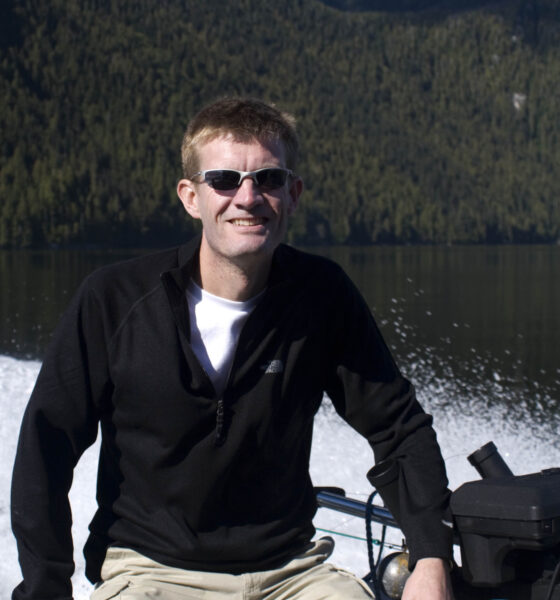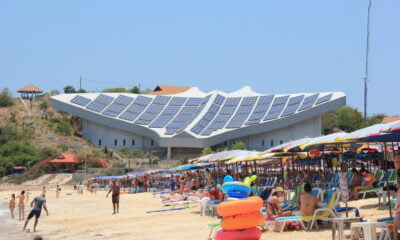

Features
Striving for sustainability
The Association of Independent Tour Operators (AITO) brings together over 140 of Britain’s specialist travel companies – and it takes sustainable tourism very seriously. B> caught up with Chris Breen, chairman of AITO’s sustainable tourism committee, who firstly explains how he got involved with the organisation, and more specifically, sustainable tourism.
I started out working as a naturalist guide in Zambia’s Luangwa Valley, which is probably one of the finest wildlife locations anywhere in the world, and in my view is certainly Africa’s. I came back and worked for a big travel agency in London. A year or two after that I started Wildlife Worldwide, which I ran and grew for many years—it’s now 20 years young and still specializes in bespoke, personalised wildlife holidays around the world.
I can’t think of a better way of spending a holiday than enjoying the beauty of wide-open spaces while at the same time giving something back to those places. Wildlife Worldwide was a member of AITO for many years. There has always been a very strong environmental and sustainable ethic to what I do. I’ve always had a strong interest in sustainable tourism. I am now the chairman of the AITO Sustainable Tourism Committee and very proud and delighted to be so.
Do you have any personal stories that have shaped your views about sustainable tourism?
One of my very good Zambian friends, as a result of the work he was doing as a naturalist guide, ended up with an opportunity to come over to the UK to do a master’s degree in wildlife and conservation based tourism. The opportunity was offered by a client who could see that this chap was a highly intelligent and brilliant guy. He now actually lectures here in the UK.
It’s an amazing story— especially for someone who had spent the majority of their life in a remote part of Africa. He now regularly travels back to Africa leading trips and teaching people about the destination and conservation-based tourism.
How does the AITO Sustainable Tourism Committee function?
Essentially, it is our job to influence the way the different members of AITO to operate from a sustainability perspective. All members of AITO are completely (and proudly) independent and many of them are doing outstanding things when it comes to sustainable tourism in the areas of the world where they operate. We try to collate a lot of that information and promote it to newer members who want help and guidance on how they can improve, whether it’s here in the UK or overseas.
Could you give some examples of sustainable projects run by AITO members?
There are many AITO operators who are doing amazing stuff—and amazingly they don’t shout it from the rooftops. There is a fantastic project in Mexico, which is supported by Nomadic Thoughts, called New Life Mexico. It works to support vulnerable children and young people through social, health and education programmes. It’s got an excellent website—well worth a look. But it’s all supported entirely by tourism and is a great example. There is a lot of extremely good work going on in The Gambia, which is being supported by an organisation called Serenity Holidays or Gambia Experience. They’ve done an enormous amount of work to help local people develop their own businesses—some in tourism— entirely backed by the tourism industry.
What do you think drives people to become involved in these inspiring projects?
Largely, in my experience, the people who are involved in this good work around the world—certainly all of my industry colleagues, friends and associates—are very much doing it for the right reasons; because they want to improve the lives of people in the destinations they work in—be that Nepal, Gabon, Brazil, Mexico or wherever.
A lot of what is done by tour operators is borne out of a great passion for a particular region.Journey Latin America, which is another one of AITO’s members, is another really good example. They do fantastic work in Mexico, Colombia and many other countries in Latin America. In my case, it was my first really wild experience of going to a really wild place. That experience helped me build a company, which has helped me personally look at different parts of the world with a respectful head on my shoulders—and it’s a fantastic privilege to be able to say that.
Responsible or sustainable— traveller or tourist… Is there a difference?
To answer the first part of the question, responsible tourism versus sustainable tourism, I think that is partly an issue of nomenclature—in so far as, what many organisations historically referred to as responsible tourism is now referred to as sustainable tourism. But I think that sustainable tourism is probably the right terminology. You could be in Canada driving along the road within the speed limit and claim to be responsible, but you might be in a car that does one mile to the gallon, so you weren’t travelling in a very sustainable manner! I think the word sustainable talks about the future, whereas responsible doesn’t necessarily take that into account. Given the choice, we’d go for sustainable every time, but for many people, it’s just the flick of a switch, perhaps wrongly so.
Regarding traveller or tourist, I’m going to give you a very personal answer. I think it’s pure and utter snobbery. I think it stems back to the time when people used to travel with backpacks—and there’s nothing wrong with that; I’ve done it myself. But there was an air of superiority from those that travelled with backpacks over people who went on a two week holiday to the south of France or Italy for example. Actually, the reality is that if you are going somewhere to see, enjoy or experience it, whether you refer to yourself as a traveller or a tourist doesn’t really matter. If you’re not a resident there, you must be a visitor. I am delighted to go to the Masai Mara as a tourist. If someone else wants to refer to me as a traveller or anything else, it makes no difference.
Who should be driving sustainable tourism—industry or the consumer?
It is absolutely the industry’s responsibility. There is no doubt about that in my mind. If a company cannot be bothered to offer sustainable holidays, by definition it must have a limited life span. If what a company is offering is destroying the very place it relies upon, then the product is finite. As an example, if I was offering holidays to go and mine gold in northern Australia, I’ve got a relatively limited time period over which those holidays can operate—I’m using up the resources—there’s nothing sustainable about that. On the other hand, if I’m offering tours to go and see places where gold exists, I can do that ‘til kingdom come.
What trends are you seeing in public awareness of sustainable tourism?
Sustainable tourism is increasingly spoken about by journalists and as it permeates the media, there seems to be an increased desire from people travelling overseas to ensure that they are doing it the right way. I’m a great advocate of travelling overseas, not only because I run a travel company, but also because it’s enormous fun and educational. Meeting people in new places is one of life’s great privileges. But for many destinations, people will have to fly, which has carbon emission implications and how horrendous that can be for the environment, so pressure needs to be applied to airlines to improve what they operate. Airlines are consequently starting to talk about the types of fuel that they are using or developing to make air travel a more sustainable option.
Could you tell us about AITO’s sustainable star classification system?
First things first: all AITO companies fulfil an obligation to 100% commitment to sustainable tourism—those are one star organisations. And depending on the level of responsible or sustainable activity, organisations can gain 2, 3, 4 or 5 stars. The star rating system was never really designed to be consumer facing—there are a number of organisations, like Travelife, that are becoming industry standard in terms of rating systems. It’s really a self-help system= within AITO to encourage members to develop and improve sustainable practices. Through training and development companies can enhance sustainability with and for each other.
What is your view on carbon offsetting?
My personal view, which may or may not be shared by AITO, is that whilst carbon offsetting is very important, we now need to think “beyond carbon”. We need to be thinking about the conservation of resources generally, whether that’s water or other minerals. And we need to find ways in which we can help local communities and some of the poorest people be resilient to the climatic changes, both short and long term, that we are all facing.
I think if people want to offset their carbon, that’s fantastic and important, but we must remember that it is only one small part of the picture. I got involved a while ago in an email discussion with a journalist who decided not to travel to a particular location in the world because it would have been too detrimental from the point of view of carbon emissions. And when I read that, it made me very angry. The particular area in question was very good for gorillas and I felt that it was important for that person to visit the area and report on what they’d seen. For me, it is utterly hypocritical to say, I’ve been there and I know how good it is, but you can’t go because this area needs to be preserved, and to get there is bad for the planet. That’s nuts.
Any other thoughts for our readers?
Discussions of this nature are interesting, especially if they have an impact—if they touch a nerve for someone somewhere. And if that one individual decides to take a more sustainable holiday or thinks about something in a more sustainable way on the back of having read an article, then this interview has been worthwhile. The message definitely needs to be projected that sustainability in travel is crucially important for us and future generations. Otherwise, our children won’t be able to enjoy many of the great things we’ve been privileged enough to enjoy ourselves.
The thing that drives me personally and professionally is that if I do what I’m doing well enough, and those people that I influence around me do it well enough, with luck and a fair wind, my three children should be able to see the many wonderful things that I’ve had the opportunity to see.
This feature was originally published in our Guide to Sustainable Tourism, which you can download for free here.
Further reading:
The Guide to Sustainable Tourism
Sustainable tourism: an essential link in the world’s ‘value chain’


 Environment10 months ago
Environment10 months agoAre Polymer Banknotes: an Eco-Friendly Trend or a Groundswell?

 Environment11 months ago
Environment11 months agoEco-Friendly Home Improvements: Top 7 Upgrades for 2025

 Features9 months ago
Features9 months agoEco-Friendly Cryptocurrencies: Sustainable Investment Choices

 Features10 months ago
Features10 months agoEco-Friendly Crypto Traders Must Find the Right Exchange





























